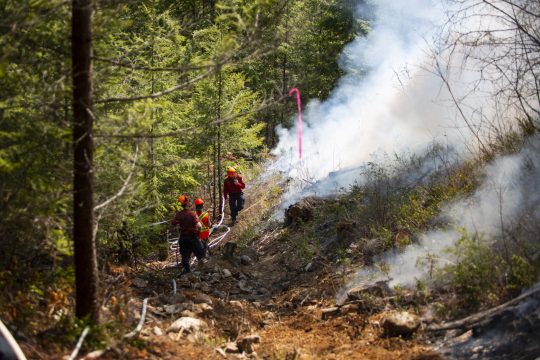Organizations that provide vital goods and services make energy-efficient moves
Welcome to our Earth Month series! Each week this month, we’re introducing inspiring examples of organizations, people and communities that are rising to the challenge when it comes to helping the Columbia Basin become more resilient to climate change and to mitigate and adapt to its impacts. Learn here how many groups have stepped up.
Plus, check out our contest and help us share the little and not-so-little steps you and your friends are taking to be more climate conscious for a chance to win weekly prizes. Earth Month Giveaways
We need healthy food to eat and affordable housing to live in. We need services that help us live our best lives. At the same time, we need to consider how we can reduce our contributions to climate change and adapt to the shifts to come.
To all these ends, farms, affordable housing operators, non-profits and First Nations around the Columbia Basin have acted to lessen their contributions to climate change and prepare for the future.
Food producers think ahead
Around since 1935, Shukin Orchards boasts over 280 acres of cherry orchards in the Creston Valley, with four varieties of cherries shipped worldwide. In 2024, it’s replacing gas tractors by buying four electric ones.
“Adopting electric tractors will help with decreasing the amount of fossil fuels our farm uses on a daily basis, reducing greenhouse gas emissions, improving air quality and creating less noise pollution within farming communities,” says Ken Shukin, President.
This orchard is just one of many food producers that have used Columbia Basin Trust support to face climate change, including farms and First Nations that grow grains, vegetables, fruit or forage; produce honey; or raise livestock for meat, dairy or eggs.
Activities have ranged widely, such as adding solar panels, heat pumps or shade to protect crops, improving site drainage, or switching to electric machinery.
It’s this last tack that Shukin Orchards decided upon. “Electric tractors offer a viable solution for farmers who are looking to reduce their environmental impact ,” Shukin says.


Affordable housing considers climate and comfort
On the east shore of Kootenay Lake, Riondel is a small community—yet large enough to make both seniors and the environment a priority. Here, the Bluebell Manor Society is installing solar panels on its five units of affordable rental housing for seniors.
“These activities will support our low-cost housing mandate by keeping utility costs lower for residents and provide a more environmentally friendly footprint for our building by taking advantage of the latest technologies,” says Gerald Panio, Chair.
Around the Basin, affordable rental housing units have been obtaining similar upgrades through a partnership between the Trust, the BC Non-Profit Housing Association and BC Housing.
In addition to adding solar panels, activities have included installing heat pumps, LED lighting and insulation.
The goal is to improve energy efficiency, reduce operating costs and increase the sustainability of older units—all while making sure they’re comfortable for tenants.




Non-profits get energy-wise
A huge range of non-profit organizations hold essential roles when it comes to well-being in the region, from serving vulnerable people to acting as stewards of the natural environment.
In Revelstoke, for example, Stepping Stones Child Care Centre provides a play-based program that promotes various aspects of each child’s development.
However, “In the past few years, there have been more extreme temperatures experienced due to changes to our weather patterns,” says Linda Chell, Executive Director of the Revelstoke Child Care Society, which operates the centre. “It has become a high priority to ensure consistent heating and cooling.”
Now, new high-efficiency heating and cooling systems are being put in place with Trust support. This will enable the centre to provide a more uniform temperature year-round while creating fewer greenhouse gas emissions. “In addition, there is an expected cost savings to the utility bills and maintenance,” Chell says.
Other non-profits have undertaken related operational or infrastructure upgrades, such as installing solar panels or heat pumps, or adding building insulation, as well as purchasing electric vehicles and installing charging stations.
The environment benefits and, in some instances, so do kids.

To learn more about how local actions are having Basin impact, visit Climate Change Stories | Basin Stories.













